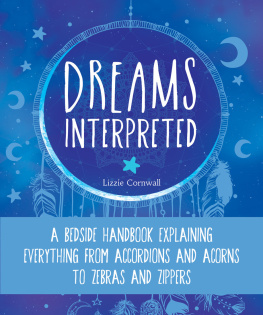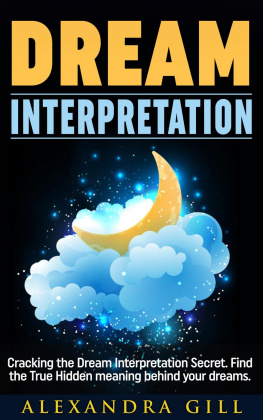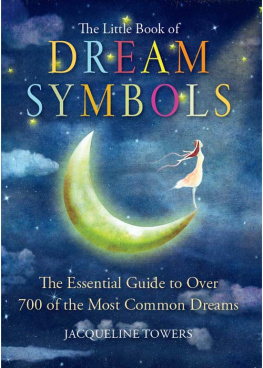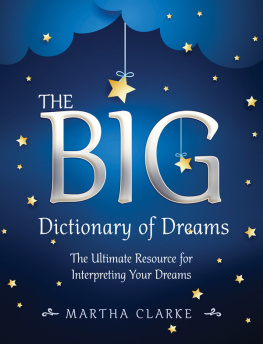

Revised edition copyright Summersdale Publishers Ltd, 2018, 2019.
First Published by Summersdale Publishers Ltd, an imprint of Hachette UK, in 2016 as Dreamopedia.
First Skyhorse Publishing edition, 2019.
Text by Anna Martin
With thanks to Hannah Adams
All Rights Reserved. No part of this book may be reproduced in any manner without the express written consent of the publisher, except in the case of brief excerpts in critical reviews or articles. All inquiries should be addressed to Racehorse Publishing, 307 West 36th Street, 11th Floor, New York, NY 10018.
Skyhorse Publishing books may be purchased in bulk at special discounts for sales promotion, corporate gifts, fund-raising, or educational purposes. Special editions can also be created to specifications. For details, contact the Special Sales Department, Skyhorse Publishing, 307 West 36th Street, 11th Floor, New York, NY 10018 or .
Skyhorse and Skyhorse Publishing are registered trademarks of Skyhorse Publishing, Inc., a Delaware corporation.
Visit our website at www.skyhorsepublishing.com.
10 9 8 7 6 5 4 3 2 1
Library of Congress Cataloging-in-Publication Data is available on file.
ISBN: 978-1-63158-435-0
E-Book ISBN: 978-1-63158-444-2
Printed in China

CONTENTS
Dream philosophers

INTRODUCTION
Dreamswe have them every night, and yet they are so mysterious. They are packed with the strangest, most gripping imagery, but then they slip away from us as we wake. Dream interpretation can be used as a form of therapythe mind has a way of unearthing memories and experiences within our dreams to help us come to terms with them, allowing us to connect with the more hidden aspects of our psyche and in turn resolve issues in our waking life. Their meanings can be discovered by interpreting the symbols contained within them.
This little book is packed with suggestions about what your dreams might mean, along with facts about sleep and dreaming to help you understand your night-time thoughts even better, and offers ways to improve your chances of remembering your dreams.
Enjoy finding out about the world of sleep, and have sweet dreams!
DO WE ALL DREAM?
According to researchers at the Lucidity Institute, we all dream throughout the night, with approximately one dream every 90 minutes. The shortest dream occurs at the beginning of a nights sleep and lasts for around ten minutes, while dreams towards the end of a nights sleep can be up to an hour long. Dreams most often occur when we experience the active stage of sleep known as rapid eye movement (REM) sleep. Its called this because one of the characteristics of REM sleep is the eyes darting under the lids at high speed. It is believed that REM sleep helps the brain to consolidate memories and plays an important role in learning, as the brain is as active as when we are conscious. Over the course of the night, our sleep patterns shift with progressively longer periods of REM sleep.
Researchers have discovered that the thought processes that enable us to recall memories shut down when we sleep, thus preventing us from being able to remember most of our dreams. The dreams that we most often remember are the ones that illicit a strong emotional reaction causing us to wake up (such as nightmares) as they can rouse us from sleep and cause the feelings to remain with us for a long time afterwards.
WAYS TO IMPROVE
DREAM RECALL
It can be frustrating to awaken from the most wonderful dream, only for it to slip from your memory as you try to recall the details. If you want to improve your chances of remembering your dreams, try these ideas:
 Decide before you go to bed that you want to remember themeven speaking your intention out loud can help.
Decide before you go to bed that you want to remember themeven speaking your intention out loud can help.
 Make your bedroom conducive to quality sleep, such as having a freshly made bed and no light pollution or gadgets that could interrupt sleep.
Make your bedroom conducive to quality sleep, such as having a freshly made bed and no light pollution or gadgets that could interrupt sleep.
 Keep a pen and a notebook beside your bed, ready to write down everything that you can remember about your dreams. Theres no need to write an essay; if its the middle of the night, just jot down a couple of words, perhaps noting how the dream made you feel or a notable image. These notes will jog your memory and may even help the dream to return so that you can relive it.
Keep a pen and a notebook beside your bed, ready to write down everything that you can remember about your dreams. Theres no need to write an essay; if its the middle of the night, just jot down a couple of words, perhaps noting how the dream made you feel or a notable image. These notes will jog your memory and may even help the dream to return so that you can relive it.
 We are more likely to remember our dreams if we wake up during the dream. Set an alarm clock to rouse you earlier than you would normally wake, and you should improve your chances of remembering your dreams. Once awake, concentrate on the dream, dont think about getting up or moving around, and allow the dream to return.
We are more likely to remember our dreams if we wake up during the dream. Set an alarm clock to rouse you earlier than you would normally wake, and you should improve your chances of remembering your dreams. Once awake, concentrate on the dream, dont think about getting up or moving around, and allow the dream to return.

LUCID
DREAMING
This refers to a type of dreaming where youre aware that you are dreaming and able to exert influence on what happens within the dream. Some advocates of lucid dreaming claim during this state they are able to find solutions to problems in their waking life or spend time, albeit virtually, with people they love. Its a curious concept that has been pondered since ancient times, from the Greek philosopher Aristotle who once said, For often, when one is asleep, there is something in consciousness which declares that what then presents itself is but a dream, right up until the present day with the lucid dream sequences in the 2010 film Inception .

All the limitations that you experience in real life no longer exist in lucid dreamsyou can have super powers, visit the bottom of the sea or the outer reaches of space, defeat your enemies, or meet your heroes. According to research undertaken by the University of Northampton, over half the population have experienced lucid dreaming, and it tends to be those who are more insightful and self-aware than others, but there are ways in which you can teach yourself to experience them. Dream experts recommend the following steps to experience a lucid dream:

State your intention before you go to bed that you want to dream.
Before you drift off, perform some self-awareness reality checks, such as looking at your hand and trying to push a finger into your palm.
Set your alarm to wake you an hour earlier than your normal wake-up time, so that you are roused during REM sleep.
When youre awakened by your alarm, turn off the alarm and then wake up without opening your eyesthis is the difficult part. Allow your body to relax into sleep once more while your mind remains active. You will experience sleep paralysis, which is when your body is temporarily paralyzed. This can be alarming when you first experience it, but it is completely normal and safe.
Next page













 Decide before you go to bed that you want to remember themeven speaking your intention out loud can help.
Decide before you go to bed that you want to remember themeven speaking your intention out loud can help.

